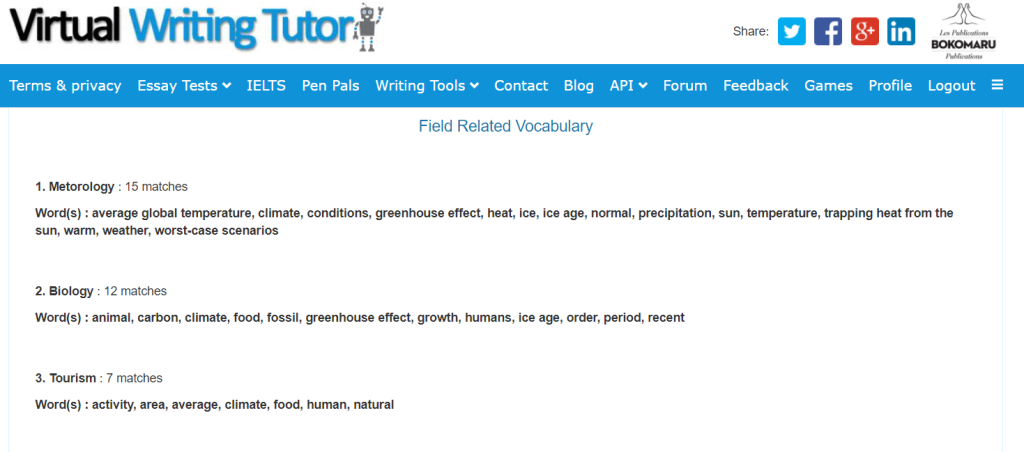
Have you ever tried using flashcards to learn new vocabulary? Learning vocabulary is an essential component of language learning. Without a large vocabulary, it is difficult for English Second Language (ESL) learners to express themselves effectively. Once ESL learners have mastered the grammar of English, the main difference between them and native speakers is the size of their vocabulary. Therefore, the most important task for high intermediate language learners is to acquire a larger vocabulary.
If vocabulary is so important, it makes sense to make learning vocabulary a priority in the ESL classroom. But how do people pick up new words? Most new vocabulary is learned by guessing the meaning of words from the context in which they appear. English-speaking children learn vocabulary just by talking with adults, asking questions, watching movies, and by reading English books. But this method of vocabulary acquisition is very inefficient and takes many hours just to learn even a few new words. Young adults with less time on their hands want a much faster method. Luckily, there is one.
Flashcards
Memorizing new vocabulary using flashcards is a fast, social, fun, and efficient strategy for learning new vocabulary in your second language. A study conducted with pre-university students learning English found that the students who used flashcards performed significantly better than the students who learned vocabulary using traditional classroom methods (Komachali & Khodareza, 2012). Many studies have found the same positive result with students learning history, chemistry, mathematics, music, economics, foreign languages, and English as a second language.
What’s a flashcard?
A flashcard is a piece of paper or cardboard with a clue on one side and a target vocabulary item on the other. Usually, multiple flashcards are shuffled together in a deck of cards, selected one at a time. One person (the teacher) shows or reads the clue, and learners try to guess the target vocabulary item. If no one can guess the answer, the teacher gives the answer before selecting the next card.
A variation of the flashcard idea is to have both the clue and the answer on the same side of the card. The advantage of this configuration is that the clue can be kept secret until read aloud during a card game that is played in small groups to promote interactive oral practice and listening skills. Students take turns selecting a card from the deck and reading the clue aloud. The first person to guess the answer correctly then keeps the card. The person with the most cards at the end is declared the winner. Used as a card game, flashcards become more social and competitive, which adds excitement to the classroom dynamic.
Flashcards are effective but uncommon in classrooms
Considering the evidence in their favour, why aren’t flashcards used more frequently in the classroom? Flashcards take time to create. Teachers under time pressure to get through the curriculum don’t want to devote many hours of class time to the creation of flashcards and to playing boisterous card games. Making the cards is therefore left to each student to do as a personal study strategy. Consequently, few students find the time to make flashcards outside of the classroom. Nobody seems to have time for good pedagogy.
Some teachers may share online resources with students in the form of interactive vocabulary quizzes. A better strategy would be to invite students to play a flashcard game in groups. The oral aspect of flashcard games makes vocabulary learning even more efficient because of the production effect (McCleod et al., 2010).
Whether your teachers use flashcards in the classroom or not, accelerate your learning by creating your own flashcards to master the vocabulary of the course. A large vocabulary will make you indistinguishable from an native speaker in your ability to communicate in the target language.
References
Komachali, M. E., & Khodareza, M. (2012). The effect of using vocabulary flash cards on Iranian pre-university students’ vocabulary knowledge. International Education Studies. https://doi.org/10.5539/ies.v5n3p134
MacLeod, C. M., Gopie, N., Hourihan, K. L., Neary, K. R., & Ozubko, J. D. (2010). The production effect: Delineation of a phenomenon. Journal of Experimental Psychology: Learning, Memory, and Cognition, 36(3), 671-685.
How to create glossaries and flashcard games fast
The Virtual Writing Tutor’s 100% free glossary, flashcard game, and online vocabulary matching exercise generator are all available through the “Writing Tools” dropdown menu on the main page of the Virtual Writing Tutor website.
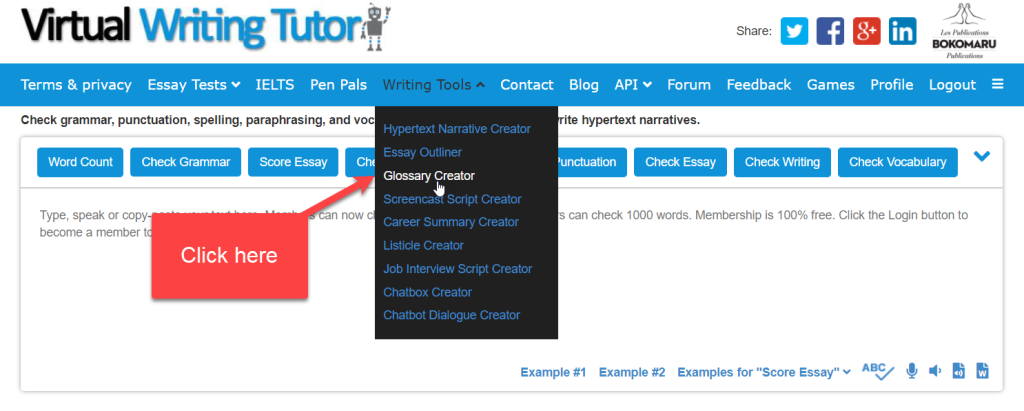
The glossary creator can help you generate multimedia glossaries, online matching quizzes, and card games very quickly. Below is a screenshot of a Climate Change Debate Glossary generated by the Virtual Writing Tutor. If you visit this glossary and scroll to the bottom of the page, you will see a link to a card game and an online vocabulary matching exercise.
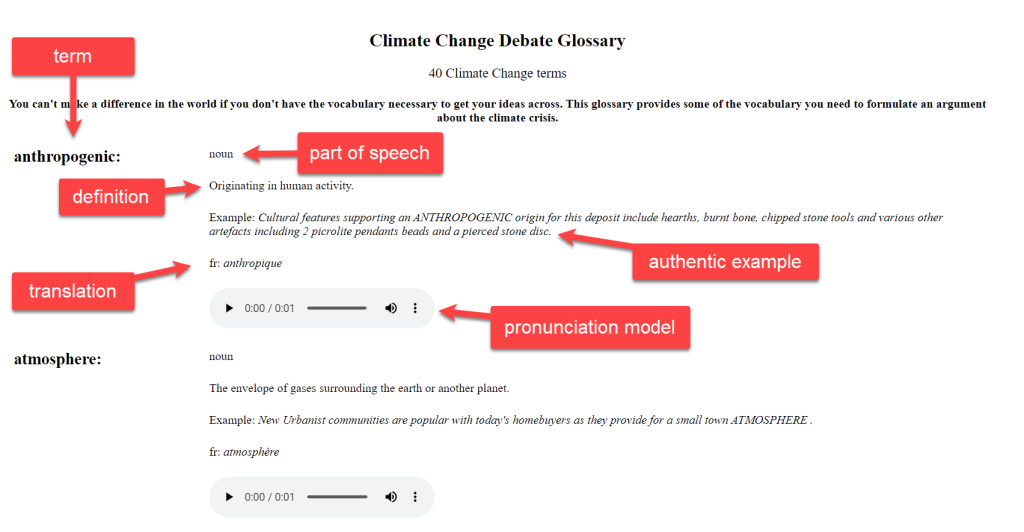
Instant matching games from a glossary
Once your glossary is finished, you can generate a drag-and-drop matching exercise online with the push of a button. Each time you reload the page, you get a fresh selection of terms and definitions to match.
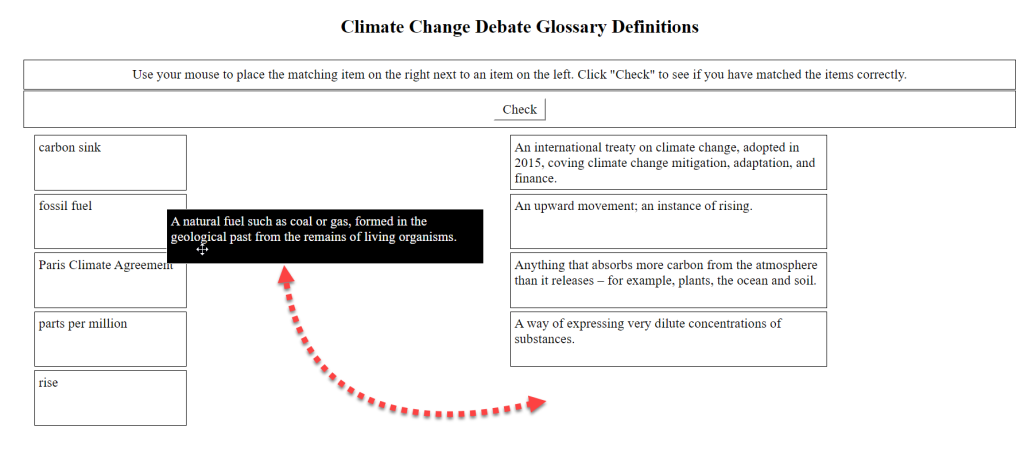
Instant flashcards from a glossary
After you have made a glossary, making flashcards is super easy. Simply click the “card game” button, and the system generates a series of flashcards that you can print to PDF or to your printer. Most students enjoy playing the flashcard guessing game. The combination of listening, pronunciation, and fluency practice makes the game challenging for students at every level.
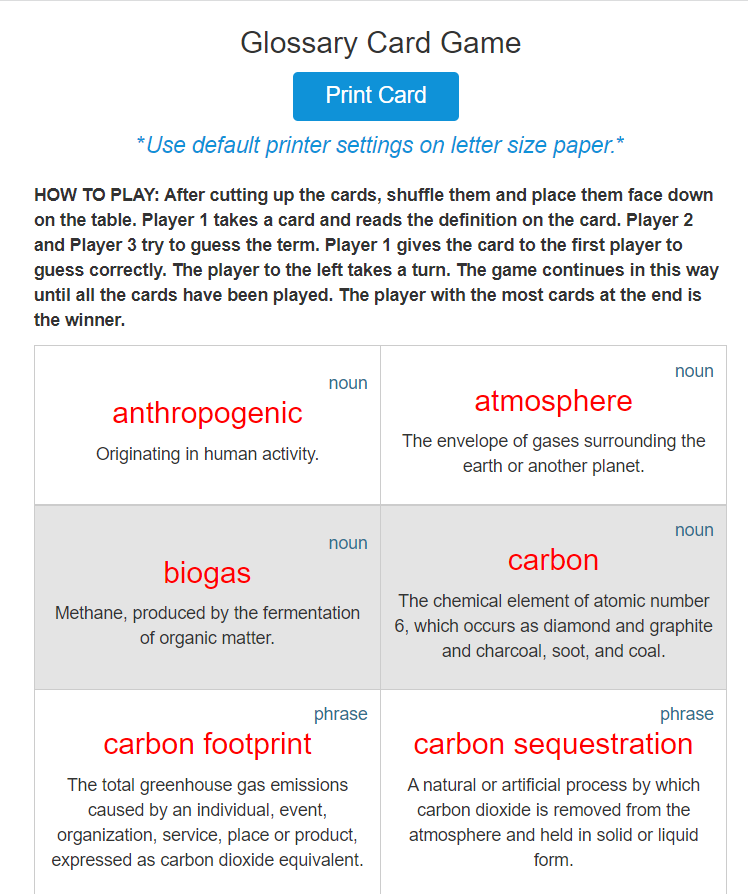
How to find difficult words in your text
Not every word in a text needs to be on a flashcard. Intermediate level students probably know the more common words in a text. So which words deserve the most attention? Probably, low-frequency words will be less familiar to intermediate level students. Here’s a great trick to find low frequency (difficult) words quickly.
Try the Virtual Writing Tutor’s “Check Vocabulary” button above the text area on the main page of the VWT to find words arranged by by frequency distribution.
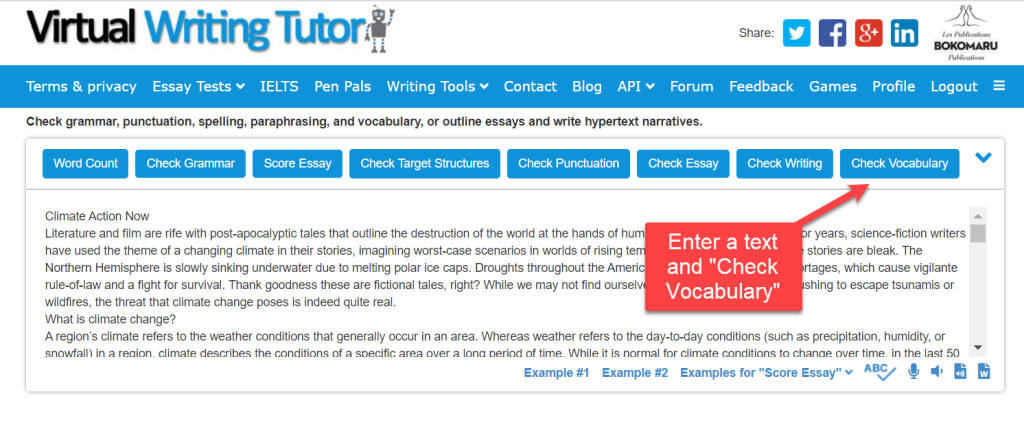
More common vs. less common vocabulary
Simply enter a text in the text area. Then, click “Check Vocabulary.” The system will compare your text with internal word lists arranged by their frequency in the language. Use the more difficult words the system finds to create flashcards and enhance your vocabulary. More difficult texts will have more high-intermediate and advanced words in them. Easy academic texts are likely to have only common words.
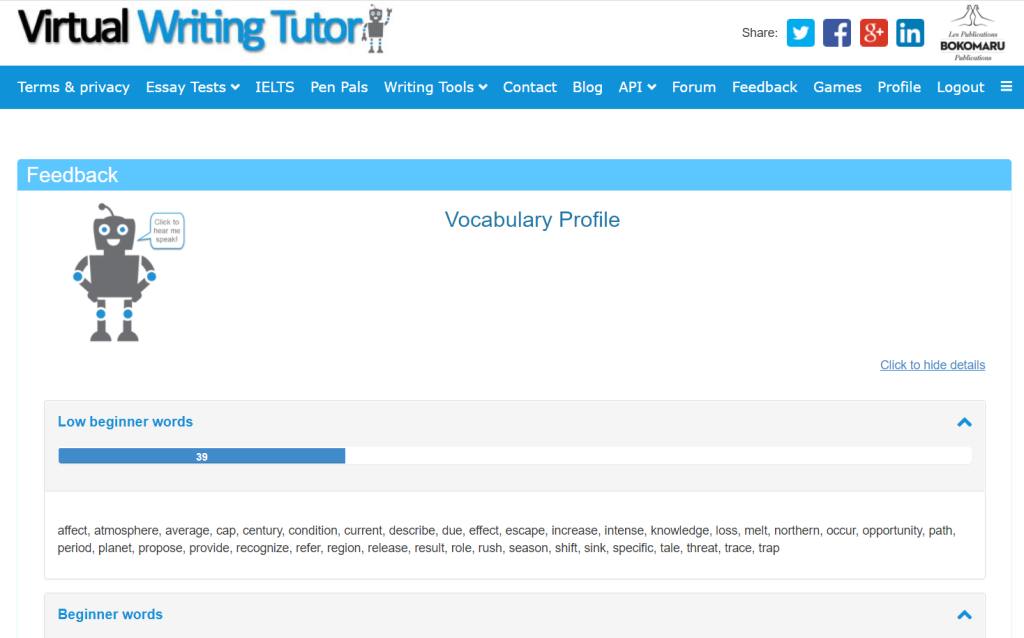
Feedback on academic vocabulary
Scroll down for the academic vocabulary arranged by frequency distribution. More common words are listed before less common words. The more academic words the system detects, the more “academic” the text will seem to most readers. Use the academic words to create academic vocabulary flashcards and enhance your university level English vocabulary.
Do you know the difference between academic and conversational vocabulary? Not everybody does.
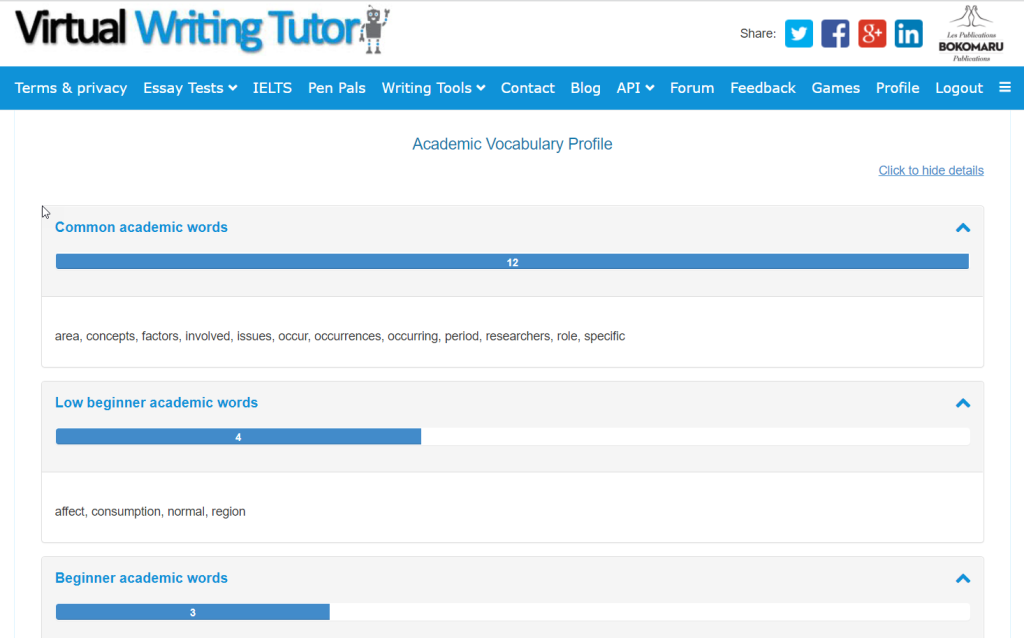
Cliches and power words
Keep scrolling to see overused words and cliche phrases. When expressions are overused, they lose their power. In contrast, the Virtual Writing Tutor can find power words that produce an emotional impact on readers. Use these power words to create flashcards and enhance your vocabulary.
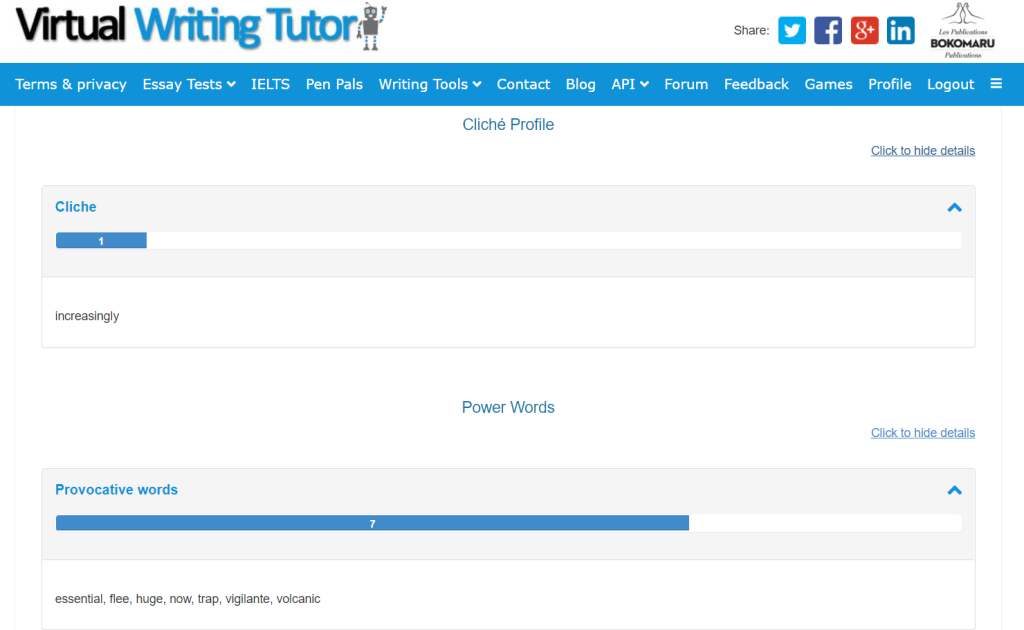
Field of study analysis
At the bottom of the feedback, the Virtual Writing Tutor will find words related to three fields of study. These words are particularly useful for students preparing for work in a particular field or preparing for further studies. Use these field-related words to create flashcards and enhance your knowledge of English vocabulary used in your field of study.
